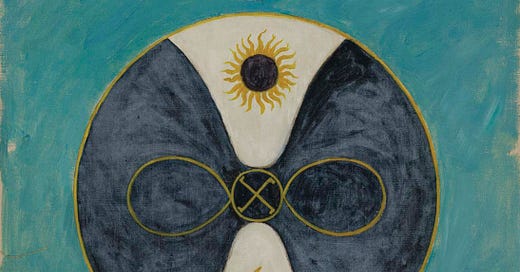Understanding Spiritual Power
Our belief that only the "worthy" can tap into this type of power leaves us all unsafe.
I’m going to explore the topic of spiritual power in several parts over the coming weeks: Why we think we’re separate from spiritual power (and the dangers of this belief); why this power can corrupt us when when we’re not conscious; how to identify when power is in shadow; what this dark power is; and why we need darkness (and to be well-equipped). My understanding of all of this is still evolving; and for much of this exploration, I’m going to lean on mystics like Sufi teacher Llewellyn Vaughan-Lee, Yeshua channel Carissa Schumacher, Episcopalian priest Cynthia Bourgeault, and more. These are just thoughts and theories; I’m very curious for you to add yours.
I first labeled this post “Understanding Power,” because I’m not yet sure if there’s much of a distinction between “Spiritual” power and “Cultural” power—particularly in our secular society. In short: Some people have it, some people don’t. And those who typically “have it” tend to exalt themselves as special and lord it over others—particularly in a Judeo-Christian patriarchal culture that’s long privileged some people over others. In short, people who have power think they deserve it, have worked for it, etc. (And some handle it beautifully.) For this post, though, I’m going to talk about spiritual power, sourced from the vertical—even as I’m not convinced that it comes from a different source than what we see played out on the horizontal (i.e. cultural power).
We make the distinction between spiritual and cultural power, in part, because we’ve taken the divine out of life. We’ve separated ourselves and our “fallen” world from the bearded man who sits in heaven, somewhere else. God seems inaccessible, not in play—certainly not available for direct engagement and relationship. In fact, much of organized religion and traditional Christianity is predicated on the idea that God is out there, mediated by an external authority: We’ve been taught to steamroll over that inner knowing or internal connection and turn our attention to priests and other middle men and mediators. We are to find God in church (or death), not in our daily lives. The Gnostic gospels—those deemed heretical and cast out—preach the opposite, that God is a direct, unmediated experience. And much of what Jesus says (or is presumed to have said) seems to suggest the same. After all, he didn’t call for an aggregated ecclesiastical power. As Father Richard Rohr writes in Falling Upward: “It makes me wonder if Jesus’s first definition of church as ‘two or three gathered in my name’ is not still the best way to avoid these sorts of illusions (Matthew 18:20). So many people I knnow who are doing truly helpful and healing ministry find their primary support from a couple of enlightened friends—and only secondarily, if at all, from the larger organization.”
We’ve taken the idea that spiritual power can only be accessed by a “worthy” or exalted person to heart—and this creates a lot of problems for us. Because while historically, spirit or light may have been congregated in certain sacred sites, and mediated by certain sacred people (Shamans, wise men, etc.), it’s readily available now. And yet, people don’t realize this: They think that those who are accessing it, tapping into it, must somehow be “special.” That they’ve been carefully chosen for this task, distinguished by this ability. This cuts both ways: In those of us who are inclined to be led, and those of us who would like to do the leading.
You see this a lot in the psychic/medium world, as well as among those who cast themselves as gurus—that their ability to channel or tap into spirit means that they are inherently more spiritual or worthy than others. That they’ve been chosen, exalted, venerated. My friend Laura Day, an incredible psychic/medium, is quick to remind people that she has her skills of divination because her brain is both damaged and traumatized by her childhood—her skills are remarkable, yes, but she would argue that this is because she’s wired differently. Some filters are missing. She does not liken her ability to a purer or higher morality. This is important.
Archetypal energies are amoral, to quote Carl Jung: Their use and impact in the world depends on the person who is tapping into them and wielding them. This understanding is critical because an ability to do it is not enough to ensure that we should be doing it. Anyone who is doing this must have their ego on a leash, and be devotedly working for the collective rather than personal gain. (See my post about Father Richard Rohr asking for his daily humiliation.)
Keep reading with a 7-day free trial
Subscribe to Pulling the Thread with Elise Loehnen to keep reading this post and get 7 days of free access to the full post archives.





